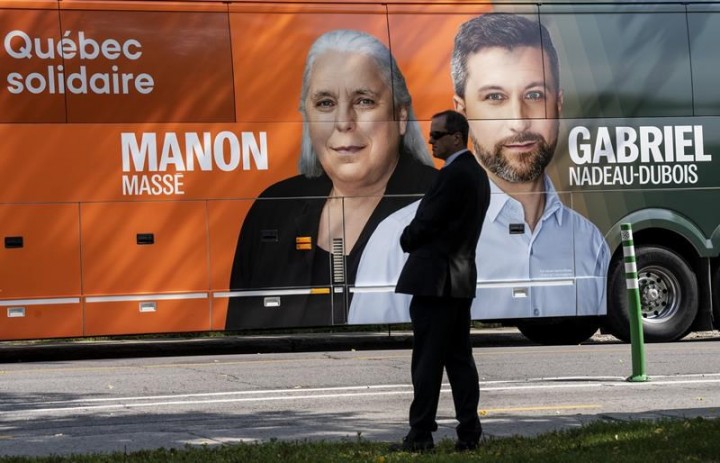MONTREAL — Gilles Bélanger, a candidate for the Coalition Avenir Québec, recently moved his children and partner out of his house, and he makes sure the doors are always locked.
The drastic steps come after a car followed him home last Wednesday, and the next day at 5 a.m. he spotted a man on his wooded property in Magog, in Quebec’s Eastern Townships. The man fled as soon as Bélanger opened the front door, but later that afternoon as he drove in a campaign car with an image of his face on it, Bélanger noticed a vehicle stopped at a traffic light next to him. He says the driver pointed at him, mimicking a revolver.
“It’s getting out of control,” Bélanger, who is running in his second provincial election after winning his Orford riding in 2018, said in an interview Tuesday. “During the last campaign it wasn’t like this at all.”
Bélanger is among a growing number of candidates from all major parties in the Quebec election campaign who have complained to police after being allegedly threatened. Quebec provincial police Sgt. Geneviève Bruneau said Tuesday that 20 people have been arrested since the start of the campaign for threats against politicians or for damage to election-related property. She said police have noticed a significant rise in threats against politicians since the COVID-19 pandemic began.
In Bélanger’s case, he says police told him to make sure none of the nine children in his family set foot in the house and to call 911 as soon as he sees something suspicious.
University of Ottawa political science professor Thomas Juneau says he has no doubt threats against politicians in Quebec and the rest of the country have increased. “This is something we should have been talking about a while ago,” Juneau, who studies national security and the safety of politicians, said in an interview Tuesday.
Resentment toward politicians has been building gradually, Juneau said, adding that the rise in anger is tied to diminishing trust in democratic institutions, the pandemic and social media.
Juneau also blames the “Trump effect,” in which the radicalization in the United States under former president Donald Trump has bled into Canada and emboldened some people to criticize institutions violently, “in a way that was considered beyond the red line not so long ago.”
Éric Lefebvre, CAQ candidate in the riding of Arthabaska, southwest of Quebec City, is calling out the threats made against him because he says they “crossed a line.”
Last Thursday, a convoy of 20 to 30 vehicles carrying upside-down Quebec and Canadian flags rolled by his home at night, with occupants screaming “Liberty!,” “F— Lefebvre” and “F— Legault,” referring to Premier François Legault, the CAQ leader. One of Lefebvre’s two daughters, who is 16 and disabled, was seriously affected by the screaming and honking, he said, adding that she no longer wants to leave the house.
“When we make the choice to enter politics … it’s rare that we have moments with our kids and partners, and the only place we can seek refuge is our homes …. I am revolted to see people come and do that,” he said in an interview Tuesday.
Lefebvre said he has stood for office six prior times — provincially, federally and municipally — and “I’ve never felt intimidated like this.”
Bélanger and Lefebvre say the pandemic is partly to blame for the rise in threats against politicians, especially those running for the incumbent CAQ, which imposed strict COVID-19 health orders, such as a vaccine passport system and two rounds of curfews.
Conservative Party of Quebec Leader Éric Duhaime has been accused by political opponents of inciting aggressive behaviour toward representatives of the state. Duhaime, meanwhile, has never hidden the fact his party has gained popularity because of his opposition to health orders.
In his defence, Duhaime has said that opposition parties failed in their duties during the pandemic to criticize the CAQ government’s restrictions, and he wants to be a voice in the legislature for those who reject Legault’s handling of the pandemic.
Juneau calls that argument “dangerous and dishonest.”
The professor says he agrees there was a consensus in Quebec among opposition parties during the pandemic. “And it was the right thing to do at the time, because it was the worst public health crisis in a century …. To say (a minority of voters) were not represented is not a problem, because we shouldn’t have politicians in the legislature who are openly anti-vaccine, as significant elements in Duhaime’s party are.”
McGill University political science PhD candidate Mathieu Lavigne is directing a project on online misinformation during the Quebec election campaign, and he says emotional distress — like the stress caused by the pandemic — increases the probability that people radicalize.
He says online rhetoric against Quebec politicians has been escalating since the start of the pandemic. “We started with the origins of COVID-19 during the first months, to discourses where François Legault is being associated with fascism and accused of treason.”
Lavigne suggests that some people feel the stakes in this election are higher than in previous campaigns. He points to a survey he conducted last year, in which he asked 2,576 Canadians — including 386 Quebecers — whether they supported vaccine mandates and what they thought of those who didn’t.
He said those most opposed to vaccine mandates felt most strongly that people with different views were a threat to their way of life.
“All actors in society have a role to play to make things better,” Lavigne said. “Politicians should avoid using inflammatory language, and government can improve access to mental health resources.”
This report by The Canadian Press was first published Sept. 14, 2022.
Giuseppe Valiante, The Canadian Press
Related
































